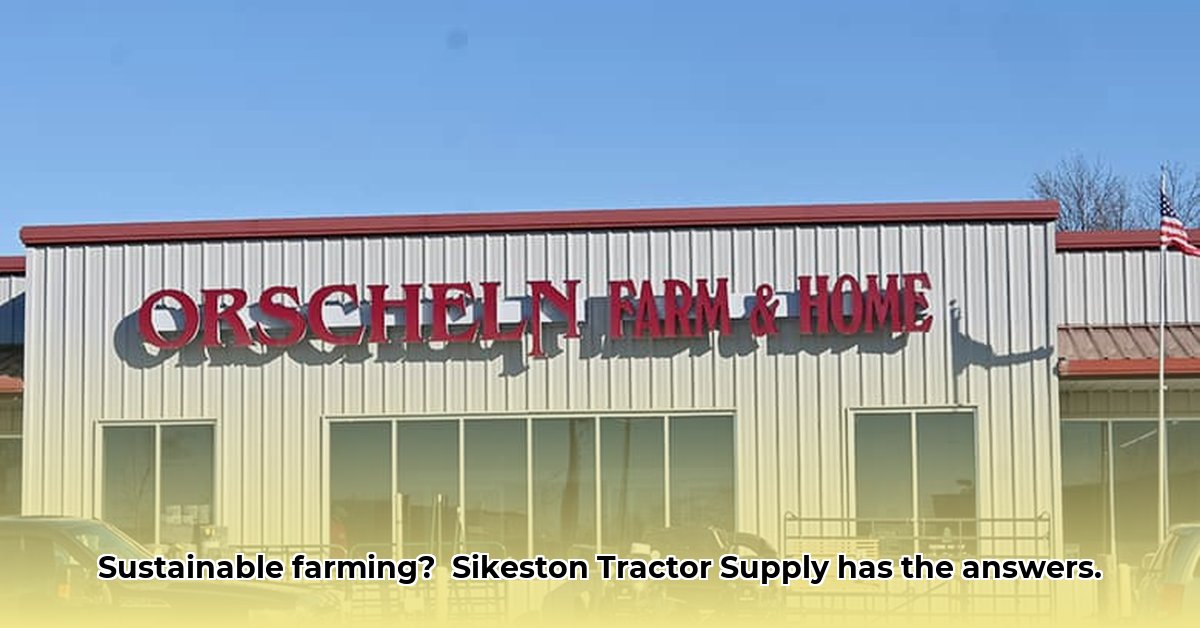
Tractor Supply Company in Sikeston, MO: A Sustainability Assessment
Tractor Supply Company (TSC) in Sikeston, Missouri, represents a significant point of access for farmers seeking supplies. For additional resources on sustainable farming practices, check out this helpful resource. While not explicitly focused on sustainability, a deeper examination reveals its potential role in supporting environmentally conscious agricultural practices in the region. This article analyzes TSC's current offerings, identifies critical gaps, and proposes actionable steps to enhance its contribution to sustainable farming in Missouri.
Product Availability and Potential for Sustainable Practices
TSC's Sikeston location, like many others across Missouri, stocks a range of products that indirectly support sustainable farming. Organic livestock feed options, for example, lessen reliance on conventional feed with potentially harmful chemical residues, contributing to healthier animals and a reduced environmental footprint. Water-efficient irrigation equipment (drip systems, efficient sprinklers) minimizes water waste, a crucial factor in drought-prone Missouri. The availability of diverse crop seeds promotes biodiversity, a key component of resilient farming systems. Furthermore, tools and supplies facilitating efficient weed control and rotational grazing enhance productivity while minimizing environmental impact. However, crucial information regarding the sustainable sourcing of these products is often missing. Do the fertilizers used align with sustainable agricultural practices? What about pesticides? This lack of transparency hinders a complete assessment.
Gaps and Opportunities: Addressing the Sustainability Shortfall
A crucial limitation is the lack of readily available information about TSC's commitment to sustainable practices. The company's website and in-store materials are presently deficient in transparently disclosing sourcing practices, manufacturing processes, and the environmental impact of their products and packaging. This absence of data regarding sustainable sourcing of fertilizers, pesticides, and other crucial supplies prevents a comprehensive understanding of their environmental footprint. Additionally, the absence of information concerning TSC's internal sustainability practices—energy consumption, waste management, and recycling initiatives—further diminishes their standing as a potential leader in eco-friendly agriculture. This lack of transparency severely limits the ability of conscious consumers and farmers to make informed purchasing decisions. One wonders: How can farmers confidently embrace sustainable practices if the information supporting those choices isn't readily available?
Actionable Steps: A Collaborative Approach to Sustainability
A more sustainable agricultural system in Missouri requires a collective effort involving TSC, Missouri farmers, consumers, and government agencies. The following actionable steps can facilitate significant progress toward a greener future.
1. For Tractor Supply Company:
1.1. Conduct a Comprehensive Supply Chain Audit: Implement a transparent audit of the entire supply chain to evaluate the environmental footprint of all products, from sourcing to shelf. (This audit should include third-party verification for increased credibility).
1.2. Implement Clear Sustainability Labeling: Develop a clear, consistent labeling system for products aligning with sustainable agricultural practices. (Include third-party certifications where available to assure quality and integrity).
1.3. Invest in Carbon Reduction Initiatives: Invest in renewable energy sources and energy-efficient technologies to reduce the company's overall carbon footprint. (Setting quantifiable targets for emissions reduction will strengthen commitment).
1.4. Foster Strategic Partnerships: Collaborate with Missouri farmers and agricultural organizations to co-develop sustainable agricultural practices and training programs.
1.5. Promote Sustainable Packaging: Transition to environmentally friendly packaging, minimize plastic waste, and implement robust recycling programs at all store locations.
2. For Missouri Farmers:
2.1. Prioritize Sustainable Products: Actively support TSC and other suppliers who prioritize sustainable products, thus driving demand for greener options.
2.2. Embrace Sustainability Certifications: Participate in relevant certification programs (organic, sustainable agriculture) to enhance the credibility of environmentally conscious farming methods.
2.3. Share Best Practices: Actively share their knowledge and successful sustainable farming strategies with others in the community, expanding the adoption of these practices.
3. For Consumers:
3.1. Ask Questions: Engage with TSC staff by directly inquiring about the sustainability of products, pushing for greater transparency.
3.2. Support Sustainable Businesses: Support retailers and businesses actively committed to sustainable agricultural practices.
3.3. Advocate for Change: Support policies and initiatives promoting sustainable agriculture in Missouri.
4. For Government Agencies:
4.1. Offer Financial Incentives: Create financial incentives (grants, subsidies) to encourage Missouri farmers in their adoption of sustainable agricultural practices.
4.2. Strengthen Policy Support: Develop and strengthen policies facilitating the growth of sustainable agriculture in Missouri.
4.3. Collaborate with Businesses: Partner with businesses like TSC to implement joint initiatives and educational programs promoting sustainable agriculture.
Conclusion: A Collective Path to a Sustainable Future
The transition to sustainable agriculture in Missouri demands a collaborative effort. While TSC holds significant potential, the transformation requires active engagement across all stakeholders. Increased transparency from TSC, coupled with informed consumer choices and supportive government policies, is essential to creating a more environmentally responsible and economically viable agricultural sector in Missouri. The collective action outlined above represents a path towards a more sustainable and prosperous agricultural future.